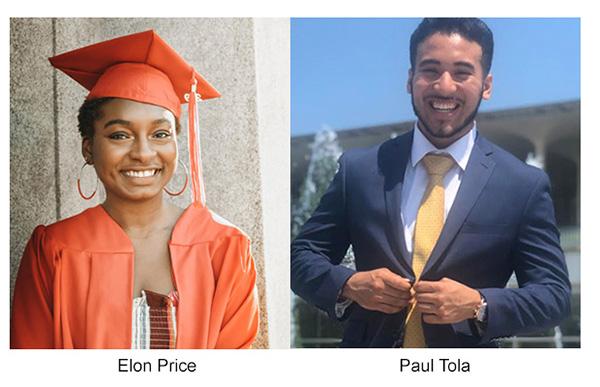NSBP/SAO EHT Scholars Program Opens New Research Pathways for Underrepresented Young Physicists

The Smithsonian Astrophysical Observatory (SAO) has partnered with the National Society of Black Physicists (NSBP) to form the NSBP/SAO Event Horizon Telescope (EHT) Scholars Program. The program aims to create opportunities for early career physicists from underrepresented backgrounds to engage in cutting-edge black hole research. It quietly launched in Summer 2020 with two interns and an eye on permanent change, and with support from the Smithsonian Institution and the National Science Foundation.
A fresh perspective on diversity sparks idea for EHT Scholars Program
SAO postdoctoral researcher Richard Anantua joined the Black Hole Initiative in March 2020, and immediately saw an opportunity to create positive change at the EHT collaboration. When asked about the purpose and goals of the program, Richard said, "The goal of the EHT Scholars Program is to create permeability between spaces in research that have traditionally been siloed, to foster new connections, and to enhance the diversity of the academic landscape. We're giving training to students who might not normally come to the EHT, and in return the students give to the missions by bringing their viewpoints to the projects they are working on."
Richard's own experience with organizations like NSBP and Prep for Prep—a leadership development program that opens access to private school education for students of color—sparked the idea for a collaborative EHT Scholars Program, which aims to ensure that students from all backgrounds have access to opportunities in advanced astrophysical research internships and mentorship by partnering up with those organizations with similar missions.
NSBP President, Stephon Alexander, also a physics professor at Brown University, is looking forward to what the program will achieve. "One of the main goals of NSBP is to support the success of Black physicists. This partnership will provide NSBP members at all levels opportunities to engage with collaborators at SAO and emerge as leading researchers."
Scholars Program marks a paradigm shift for EHT
The move towards actively recruiting undergraduate interns is new for EHT. The group previously allowed its reputation to draw in potential interns. Shep Doeleman, Founding Director of the EHT said, "In the past, we didn’t recruit undergraduates. We were hearing from people who were self-selecting, and who already had immense support and encouragement. That's not representative. EHT provides an opportunity for young physicists early in their careers to be involved in a high-profile project, and the Scholars Program is our way to make that happen more equitably."
Inaugural interns make big waves with meaningful projects
The EHT Scholars Program welcomed its inaugural interns—Elon Price, a graduate student at Fisk-Vanderbilt and a member of NSBP, and Paul Tola, an undergraduate student at SUNY New Paltz and a member of Prep for Prep and the National Society for Hispanic Physicists (NSHP)—in July 2020.
For Elon, the program offered an invaluable look into the opportunities available within the field of astrophysics. "I got exposure to astrophysics and general relativity in a way I never considered. I'm now very interested in this type of work." Elon's research focuses on modeling, and simulating the accreted plasma observed by the EHT in order to help design advanced EHT array configurations. Elon is advised at SAO by Richard Anantua and Christian Fromm.
The program offered an opportunity for Paul to further develop skills that could help him to launch a career in myriad areas of science and technology. "This experience has helped me develop a problem-solving and solutions-based mindset, to shift my perspective and methods to continue to make progress and has taught me how to decipher between lots of data to figure out specifically what is important. These abilities are crucial for a number of fields and are something I will take with me to my next endeavors." Paul's research focuses on the development of simulations of very long baseline interferometry (VLBI) to assess requirements for sensitivity at ngEHT telescope stations, and to investigate the effects of atmosphere, telescope mechanics, and other perturbations on the quality of simulated observations. Paul is advised by EHT instrumentation team member Alexander Raymond.
What next?
The EHT Scholars Program will accept applications for its 2021 program this winter. In the meantime, Richard is considering all that the program can be. "The EHT Scholars Program started at SAO because we're leading the next generation of EHT projects, but this could be a template for a global internship program to get underrepresented minorities all over the world more involved."